Monday Feb 16, 2026
Monday Feb 16, 2026
Wednesday, 23 February 2022 02:29 - - {{hitsCtrl.values.hits}}
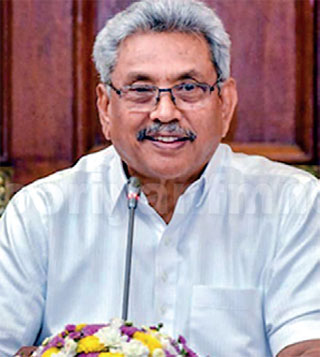
President Gotabaya Rajapaksa
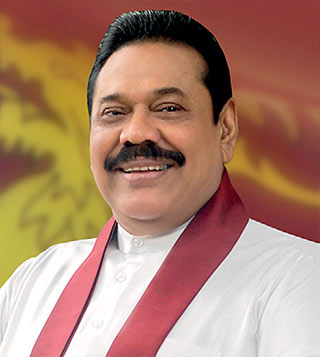
Prime Minister Mahinda Rajapaksa
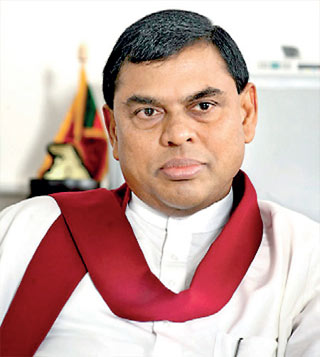
Finance Minister Basil Rajapaksa
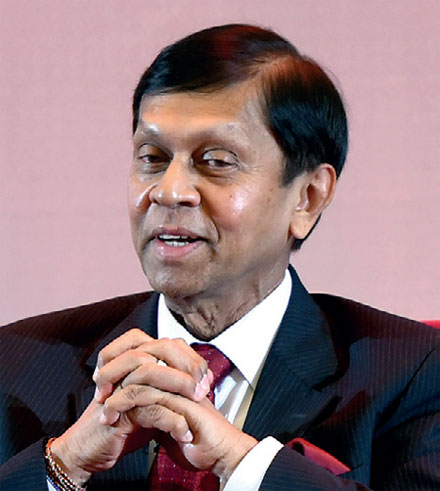
Central Bank Governor Nivard Cabraal
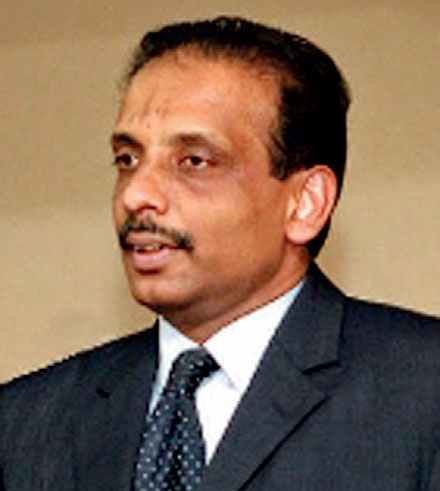
Treasury Secretary S.R. Attygalle
|
 The country is facing a severe financial crisis, each passing day a challenge. The foreign exchange level is at the lowest in history, around $ 1.5 billion. The country is expected to settle $ 6.4 billion in liabilities during the current year, also until 2025 the Government’s annual external debt repayments are around $ 4 to 5 billion each year. The worst is every month the import costs exceed FE earnings by around $ 1 billion.
The country is facing a severe financial crisis, each passing day a challenge. The foreign exchange level is at the lowest in history, around $ 1.5 billion. The country is expected to settle $ 6.4 billion in liabilities during the current year, also until 2025 the Government’s annual external debt repayments are around $ 4 to 5 billion each year. The worst is every month the import costs exceed FE earnings by around $ 1 billion.
Basic causes of the issue
The country’s downward trend started with conversion of administration and teaching to Sinhala in 1956, dividing the country among ethnic lines. Subsequent politicians bribed the public with numerous gifts for their votes. Meanwhile politicians enriched themselves. The climax was the duty-free vehicles to MPs and Government staff, extending to motor cycles to lower grades. Meanwhile, political leaders robbed the country of billions of dollars. Now, the country is called upon to pay-back the debts, the question is how?
The Government’s dreams
Central Bank Governor Ajith Nivard Cabraal is confident that the situation is under control and all dues would be settled, as in the past. Finance Minister Basil Rajapaksa is going along with the Governor, but is less confident. Energy Minister Udaya Gammanpila claimed the majority of Cabinet Ministers wish to seek IMF assistance to overcome the crisis, but are they aware of the consequences?
Current Government was unfortunate to face the COVID pandemic, underwent heavy expenses in procuring vaccinations and tourism income dropped. The country was locked down, productions stopped, meanwhile Government employees got their full salaries, while most countries reduced employee salaries. During early stages locals employed abroad sent Dollars home. But the Government held down the exchange rate, others offered higher and official FE receipts came down, worsening the situation.
The Government is dreaming that friendly countries such as India, China and Japan would come to the rescue and settlement of dues amounting to $ 6.4 billion during 2022 could be met.
Crashing of agriculture sector
The President’s election manifesto indicated moving over to organic fertiliser over 10 years. But in April 2021 the President suddenly announced moving over to organic, possibly to overcome FE shortage. But the program lacked preparation, failed to enlighten farmers on organic usage, and collapsed without proper fertiliser. Plenty of rain during the period would have given a bumper harvest, but the farmers were unprepared. Also, Opposition politicians manipulated the situation, with multiple farmer protests shown on TV news further discouraging the farmers.
With banned imported chemical fertiliser, a Chinese shipload of organic fertiliser was rejected, when a state laboratory found unsuitable materials. The supplier’s request for independent testing was refused, finally the country had to pay.
Tourism sector
Tourism was the third highest foreign exchange earner for the country. In 2019 even after the Easter terror attacks, the country recorded 1.9 million tourist arrivals bringing in $ 3.5 billion, a 21% drop from the previous year. The country received 82,327 tourists in January 2022 compared to 1,682 in January 2021. The Tourism Ministry expects $ 2.12 billion inflow for 2022. But most arrivals are low-level who travel to Ella by train and have meals in local eateries. The Government also expects a large number of Indian tourists. The arrival of high-end tourists would depend on the settlement of the COVID-19 pandemic in Western countries and the reflection of Sri Lanka in their eyes.
Remittances from abroad
The country depends heavily on remittances from workers abroad, but amid global and domestic lockdowns receipts fell to $ 375 million in April 2020, but recovered to $ 446 million in August, but fell when informal sectors offer higher rates for Dollar, resulting in the country’s forex reserves hitting $ 1.6 billion in November. The situation will continue until the Dollar is floated.
Electricity crisis
The country is facing electricity power cuts, with more expected in coming months. Last year’s heavy rains resulted in the majority power generated through hydro, but two months without rain, water levels in reservoirs are down to 50%. Water levels cannot be expected to rise again till June. But how about electricity generation until then?
Thermal power plants using imported oils are facing shortages, generators stopping production. But Chairman, Public Utilities Commission of Sri Lanka informed the public that there will be no power cuts over the next three months, provided no major breakdowns in generating plants, also oil being delivered on time.
Obstruction to renewable energy
My article in Daily FT “Prominence to renewable energy would have averted electricity crisis” described in detail how CEB obstructed renewable energy projects, especially solar and wind. If they were allowed, they would be producing over 2,000 MW by now. Although solar power is only during the day, it would have saved water from reservoirs, allowing peak night time generation.
CEB also prevented small hydro and bio energy projects for the past five years. Gliricidia based power plants would have generated power 24/7, reducing the load on oil-based power plants.
University education
The President employed 60,000 jobless graduates and instructed universities that every student be taught English and IT. He also wished for legislation for private universities such as Kotelawala Defence Academy. The President as per his vision is planning five technology parks across the country, but is slow in implementing.
Meanwhile, the University Grants Commission (UGC) wishes authority over private universities. But under World University Rankings our best is University of Colombo with a rank of 1634, others are all below. How many of our universities produce high demand IT graduates? UGC needs to look at the employability of their graduates.
Most private universities direct their students to foreign universities after a few years. SLIIT with a student population near 10,000, produces graduates mostly employed in the private sector. SLIIT managed to escape from Mahapola Fund, is an independent authority aiming to be similar to Harvard University in the US. Meanwhile, the Cabinet approved a proposal to bring SLIIT under Mahapola.
Industry
In 1977, Sri Lanka became the first country in South Asia to open its economy. But we failed in attracting high technology industries, mostly due to poor education. The country needs a leap in the investments in higher education, research and technology.
Meanwhile, SLINTEC Academy is having its first ever General Convocation in March 2022 where six MPhil students in Nano and Advanced Technology and six PhDs in Nano-Science and Technology will graduate.
Public servants on strike
Government teachers’ three-month strike refusing online education won their demands. Now the health sector has stopped work demanding the full-cake. With the rising cost of living, others too would be demanding.
Balancing act
According to the Central Bank, the country’s total outstanding debt by April 2021 was $ 35.1 billion. Exports during 2021 were $ 12.5 billion while imports cost $ 20.6 b led to a deficit of $ 8.1 b. But 2021 was a low oil import year with most power generation with hydro. Now with poor rainfall electricity is generated with expensive oil, resulting in a situation with one billion dollars short each month.
Paying the debts
The country is expected to settle $ 6.4 billion in liabilities during the year. The Government expects help from friendly countries such as India, China and Japan. Sri Lanka has already or nearly received $ 1.9 billion worth Indian relief package.
When Basil Rajapaksa visited India two credit lines for food and fuel, worth $ 1.5 billion and $ 912 million loan were announced, limited for imports from India. In December 2021, the country got a $ 1.5 billion currency swap with China, which Ajith Nivard Cabraal boasted boosting forex reserves to $ 3.1 billion. But when having to pay for the returned organic fertiliser ship from China, Yuan could not be used.
Even if friendly countries help to settle current year’s dues, how about next year, including instalments of loans already given by friendly nations? Thus, the country has no option other than resorting to IMF help.
IMF help
Sri Lanka has obtained IMF support on 16 occasions starting from 1965. IMF assists countries by providing them financial support, while the country implements adjustment policies to restore economic stability and growth. Also help to address crisis situations as payment for essential imports or debt repayments.
IMF lending is usually accompanied by a set of corrective policy decisions agreed with the receiving country. Thus, while IMF provides lending, it also expects the country to implement corrective policy decisions, which caused the basic problem. Going to the IMF also provides a seal of approval to foreign organisations that appropriate measures are taking place.
Basic problems
The country’s problems existed over a long period, but became a crisis with corona. Question is, do our political leaders understand the issues? They are
a. Expensive politicians with their salaries and allowances, vehicles, housing, personal staff, security staff, etc.
b. State employees number 1.5 million and another 400,000 in state corporations, mostly doing nothing, occupying comfortable chairs, with a computer in an air-conditioned office.
c. Over 1.5 million Samurdhi holders, most could be gainfully employed, but the facility was offered to relatives or friends of Grama Sevaka or Samurdhi officers. Their allowances were increased this month.
d. Most Government institutions and corporations run at a loss, mostly unknown to the Finance Minister. Few days ago, when the General Manager, Government Railway requested FM acceptance to increase season-ticket costs by 40%, FM ridiculed the request. If FM becomes aware of the actual season travel payments by Government staff for their daily train travel, charges would be increased by 40-fold, not 40%.
Addressing basic issues
If the country were to survive and recover basic issues need to be addressed, with IMF assistance. Surviving would depend on cutting down unnecessary expenditure, imports and being self-sufficient.
President’s blunders
Gotabaya Rajapaksa made a serious mistake by suddenly moving over to organic fertiliser. Now he could correct by recommending 50% organic fertiliser offered free by the State and 50% inorganic fertiliser at a reasonable price, considering rising prices in international markets.
He offered to purchase Nadu paddy at Rs. 95 from farmers, happily accepted by farmers would lead to wholesale rice costing Rs. 175. The President could claim the offer is only for the failed Maha harvest and Rs. 70 from Yala, but rice still costs Rs. 125.
Electricity from renewable energy
To overcome the electricity crisis the President needs to declare an “Electricity Emergency” under emergency law and bring in legislation for an “Emergency RE Development Plan”, overriding objections and delays by CEB, valid for three years only. He could appoint a knowledgeable person as Chairman under Nalaka Godahewa, only MP with a BSc Honours degree from University of Moratuwa in Electronics and Telecommunication Engineering and a PhD in economics. If issues faced by renewable energy producers are addressed immediately, electricity generation from new RE projects would start in six months, with the possibility of reaching 60% electricity from RE sources in three years, allowing the Electricity Emergency to be lifted.
Rising oil prices
Oil costs have risen to the highest in years, but retail prices remain unchanged. The price formula introduced years ago needs to be brought back. With rising prices customers too will be careful and control consumption.
Tourism and railway
Currently most arriving tourists are low-level travelling to Ella by train. Also, Ella residents have converted themselves to serve the tourists. Now General Manager, Railway is accused of getting down railway engines not suited to hilly up-country and carriages suitable for higher level travellers with A/C and reclining seats, unsuitable for daily travellers to work.
The imported engines and carriages can be used to promote low-level tourists travelling to 1. Anuradhapura and Mannar, 2. Trincomalee, 3. Polonnaruwa and Batticaloa (Passikudah) 4. Puttalam (Kalpitiya) and an additional train to Jaffna. At the beginning, tourist numbers would be low, but when locals realised support services would appear overnight.
Education
The country’s education system has failed and universities need to be reconstituted to produce only employable graduates. Arts courses need to be drastically cut-down and IT introduced in a massive way. In addition, school curriculum needs complete change with reintroduction of English medium. More students after AL need to be directed to technical education as German Technical Institute is established in every district.
Improving agriculture
Agriculture employs large numbers cultivating small patches of land, while farmers demand sufficient income for their living. Thus, it needs introduction of new technology allowing improved cultivations in limited lands, producing higher quantity and better quality. Sandy grounds around Chilaw are suited for orchid and flower cultivation for exports.
Our exporters could produce more coconut-based products with better supply, increased production achievable with drip-irrigation. In Kerala 95% of coconut lands are drip-irrigated, with 50% support from the Government. A similar arrangement would improve coconut production overnight.
Livestock Development Board, largest landowner in the country, mostly coconut. Their cattle yield an average of 2.5 litres of milk a day, whereas high-level private Companies feeding cattle in cattle-sheds receive 20 to 25 litres a day. With improved management practices increasing yields to over 10 litres a day would not be difficult.
Cutting down costs
Surviving the country would depend on cutting down costs, especially at a time of increasing prices of every item.
Reform public sector
State sector is severely overstaffed and needs reduction, with large numbers absorbed from unemployed graduates, inefficient with poor knowledge. They need to be encouraged to study to qualify in IT and Accountancy for private sector employment.
Reduce Samurdhi only to deserving
The country cannot afford massive expenditure on Samurdhi recipients, each receiving family needs to be investigated and only essential be given the facility.
Striking Government workers
Health workers have struck work and threaten to continue, with rising costs every Government worker would demand a salary increase. Earlier strikers were on no-pay and were careful in reducing their salary. Decades ago, returning strikers demanded no victimisation, which the Government agreed. No victimisation was converted into no salary-cut. The original no-work, no-pay concept needs reinstatement, most strikers would think twice, work stoppages would reduce.
Surviving with IMF
The country could survive only with IMF assistance to overcome immediate foreign exchange challenges and restructuring the public sector. Floating the Dollar will raise import Rupee prices, but quick clearance of imported goods, non-paying of port penalties will reduce costs. The consumer would benefit at retail level.
Protests from State workers and public
When IMF reforms are introduced, public servant unions would protest demanding salary increases to continue their lifestyle.
In July 1980 working class unable to bear rising prices demanded a monthly wage increase of Rs. 300 and an allowance with rising cost-of-living index. Even after Government prohibitions, nearly 400,000 state and private sector employees continued strikes. Resulting Government action declared nearly 300,000 sacked, finally 40,356 persons lost their jobs.
The only way to reduce State employee numbers would be to induce them to participate in a similar action as in 1980, the situation is fast becoming similar.
Reducing expenses on Ministers and MPs
The highest unnecessary expenditure is the massive expenses on Ministers and MPs, although the President continues a simple lifestyle. MPs are provided with salaries and multiple allowances, personal staff mostly family members, multiple vehicles, armed escorts, massive security to houses, etc. They are given luxurious meals in Parliament canteen including breakfast, although cessions start in the afternoon. The free canteen facilities are extended to Parliament staff and drivers.
Our expenses on parliamentarians are the highest in the world. British Prime Minister Boris Johnson, until being appointed PM, attended the Parliament on his bicycle. His wish to continue was objected to by security staff. Angela Merkel, German Chancellor retired recently lived with her husband in an apartment without any servants.
Our Parliamentarian’s allowances need to be reduced, vehicles be restricted to one with a driver and a security officer, personal staff discontinued but offered three members from existing Government staff. In addition, a single policeman guarding the residence.
If above be carried out, when restrictions are placed on Government staff and public, they would happily bear the burden and the country would prosper with IMF assistance. Also, in future no big-mouthed uneducated would wish to enter politics.